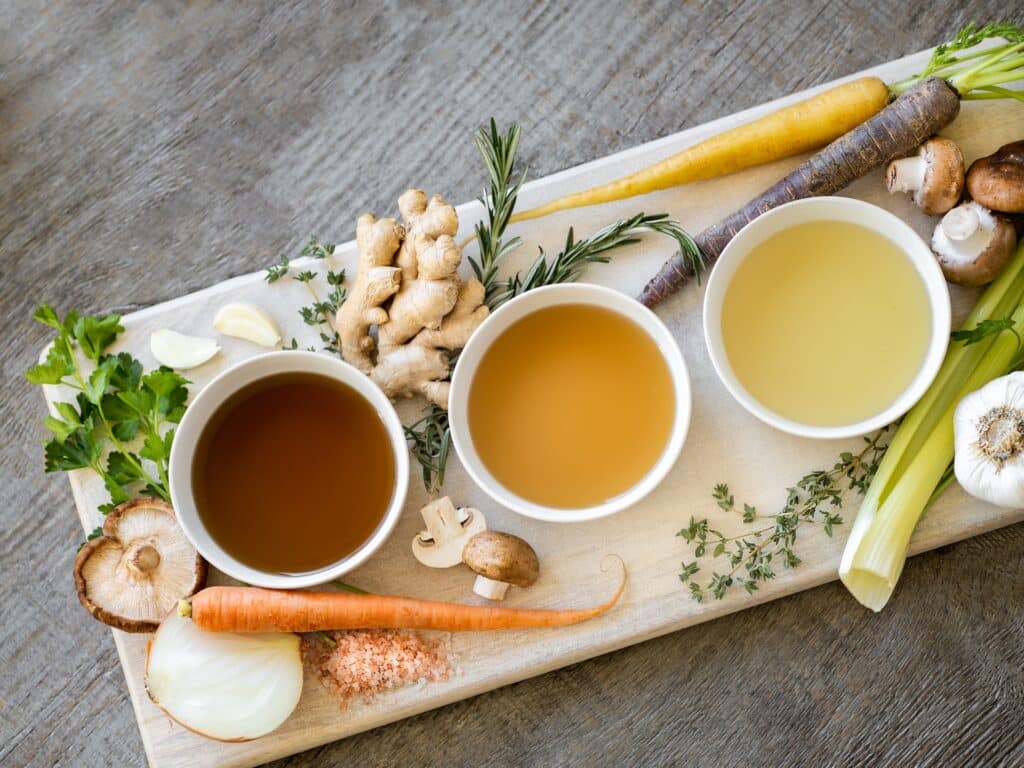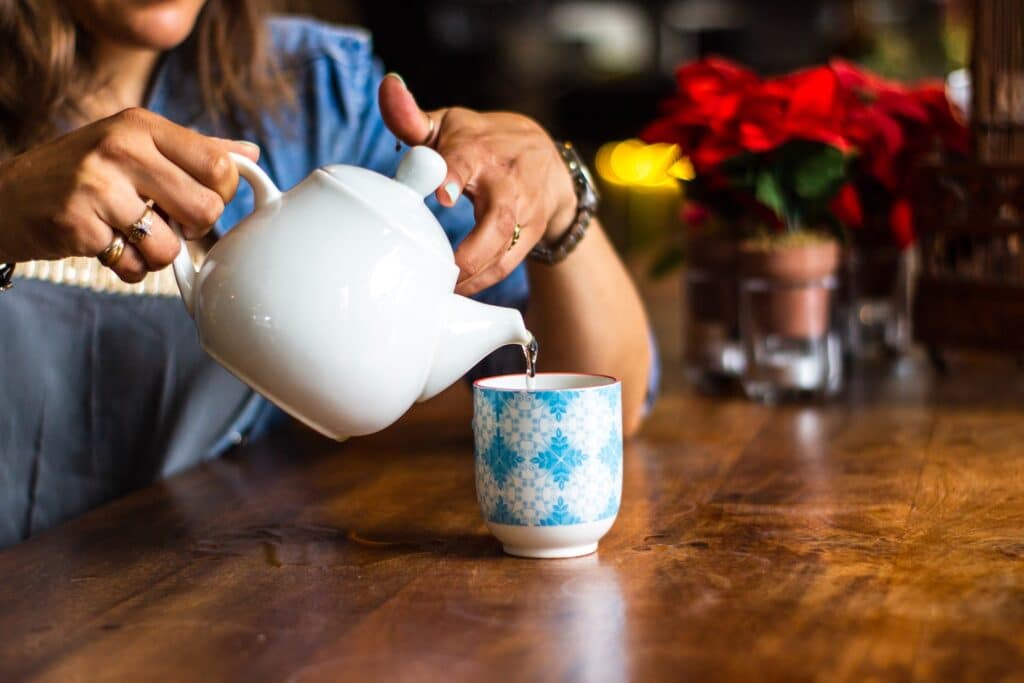Does your mouth feel dry when you drink tea or other caffeinated varieties of drinks or beverages, so much so that you always drink a cup of water afterward and wonder why this is so?
Tea makes your mouth feel dry because it contains tannins, which have astringent properties, meaning they can bind to and precipitate proteins in your saliva and the mucous membranes of your mouth. This protein-binding action reduces lubrication and creates a sensation of dryness or puckering.
Tea Consumption and Dry Mouth Sensation: Why Does Tea Cause Dry Mouth and Throat?
Tea is a well-known and widely consumed drink, though some countries drink more tea than others.
Likewise, tea serves many purposes.
Tea consumption is more medicinal than just a habit or morning routine for some. Whether you like to consume tea in the morning or later in the day, one thing is common among many tea enthusiasts, and that is a dry mouth.
This beverage-induced dry mouth is also called astringency. However, why is this so?
The dry mouth feeling you get after drinking tea is caused by a simple natural chemical called tannins.
This natural chemical compound is also found in beverages like coffee, wine, fruits, alcohol, and dark chocolate.
Although tannin has numerous health benefits, it can cause beverage-induced dry mouth, making you long for a cup of water after drinking a cup of tea.
This begs the question, how does tannin lead to a dry sensation in the mouth, or astringency?

Everything You Need to Know About Tannins in Tea and How They Cause a Dry Mouth Feel
Tannins are a subgroup of a larger group of compounds called polyphenols. Most edible and inedible plants naturally contain tannin, which serves many purposes. For instance, in plants, tannins are a natural repellent to animals. Due to their bitter taste, most animals wouldn’t eat plants rich in tannins.
However, the rich, bitter flavor of tannins in food and drinks/beverages is desirable to humans. Apart from the rich taste, many people consume foods rich in tannin, such as the tea plant, due to their several health benefits. For instance, epigallocatechin gallate (EGCG), a type of tannin, is known to reduce inflammation.
Ellagitannin, another type of tannin, helps the body promote the growth of beneficial gut bacteria. They may also help to reduce the growth and spread of cancerous cells in the human body. Furthermore, tannins also contain antioxidants and have antibacterial properties. They may also help to protect against heart disease.
Despite the numerous health benefits of tannins, there are some downsides. One of the biggest downsides is a symptom called astringency (dry mouth). This is because tannins have a lingering effect on the mouth, and their tiny molecules can easily bind to our salivary glands. When this happens, our salivary glands cannot produce saliva. Hence the dry mouth and throat feeling we get when drinking tea.
However, is this the case with all types of tea? Let’s find out!
What Type of Tea Contains Tannins?
Some believe that tannins can only be found in black tea, but that’s far from the truth. All types of tea contain tannins because they come from the same tea plant, Camellia sinensis. However, the concentration level may differ from one type of tea to another due to how they may be processed.
Black tea has the highest concentration of tannin, especially strong black tea. This is because of the drying nature of the oxidation process used to extract the flavor and produce black tea leaves.
Pu-erh tea also has a high concentration of tannin because it is produced using oxidation.
Green tea, on the other hand, has a minor level of tannins, while oolong and white tea have a mid-level concentration of tannin.
In a nutshell, all types of tea, except herbal teas, have a certain level of tannins. This is because herbal teas are made from herbs and spices.
Why Are Tannins in Tea Leaves? Why Does Tea Make My Mouth Dry
Tannins naturally serve a preservative purpose in tea leaves. They help protect the leaves from harmful bacteria that could hinder their growth.
Furthermore, the odor and flavor of tannins in the tea leaf helps to prevent insects and other predators from being attracted to the leaves and eating them, consequently preserving the leaves

How to Make Tea That Does Not Make the Mouth Dry: Remedies for Dry Mouth from Tea
Here are a few ways to resolve the dry mouth sensation or astringency from tea if you don’t want to give up drinking tea altogether
- Add milk or cream to your tea. This is the simplest solution to this challenge. Adding skim milk, regular milk, or cream to your tea will not only enrich your tea. It will also dampen the bitter flavor and astringency effects. Consequently, this prevents a dry mouth sensation.
- Reduce the leaf-to-water ratio. The amount of hot water you use to brew your tea can significantly impact the concentration level of both bitterness and caffeine in the tea. The more concentrated your tea is, the stronger the feeling of astringency, and vice versa. To resolve the dry mouth sensation, you may get from your tea, boil the tea leaf with more water. The hot water-to-tea leaf ratio should be 70:30, with the hot water being 70% and the tea leaves being 30%. Brewing your tea this way will lessen the feeling of astringency,
- Only use premium Quality tea leaves. Low-quality tea leaves tend to have a higher concentration of tannins. This is probably because they’re poorly produced. When you brew and drink them, they release much of the bitter flavor and compounds that cause a dry feeling in your mouth. However, this differs with premium-quality tea leaves, especially whole tea leaves. Whole tea leaves tend to diffuse much slower than broken tea leaves. So, if you want to make a tea that doesn’t give you a dry mouth, use premium-quality whole tea leaves.
- Rinse tea leaves with cold water before brewing. This is another way to prevent getting a dry mouth after drinking tea. You can soak and wash the tea leaves in cold water before brewing. Soak tea leaves in cold water for 3–5 minutes, drain, discard the water, and brew your tea using fresh water. This process will cause a significant amount of the tannins in the tea leaves to dissolve, thus helping you prevent the dry mouth sensation.
- Reduce the steeping time. If you leave the tea leaves in boiling water for too long, you’ll end up with very strong tea. In other words, more tannins will diffuse inside your tea. Consequently, you will get a stronger astringency after drinking the tea. However, if you want to reduce the tannins diffused into your tea, only steep your tea leaves or tea bags for a few minutes.
- Add sugar or honey to the tea. Sugar and honey can help balance your tea’s bitter taste and make it less astringent. So, add a little sugar or honey to your tea to lessen the effect of the tannins in your cup of tea.
- Eat foods and fruits rich in vitamin C before or after drinking Tea. Foods and fruits like potatoes, oranges, and strawberries can also help neutralize the tea’s tannins. Plus, chewing increases saliva in the mouth. Hence, eating these foods before or after drinking tea can help keep your mouth moist and prevent that dry feeling in the mouth.
- Drink decaf coffee, black or green tea. Taking the decaffeinated variety of tea or coffee can also help to reduce dryness in the mouth. So, you could replace your tea and coffee supplies with these options.
Final Thoughts
Tannins are one of the primary compounds found in tea and may be more profound in black tea than in other teas like green tea. It is also much less prevalent in decaf coffee. Although they tend to cause that astringent feeling in the mouth, they also add a rich flavor to your beverage, in this case, tea.
You shouldn’t stop drinking your favorite beverage just because of the dryness from tannins, because they also have many health advantages.
Instead, use the tips above to reduce the likelihood of your tea making your mouth and throat dry and improve your tea-drinking experience today!

